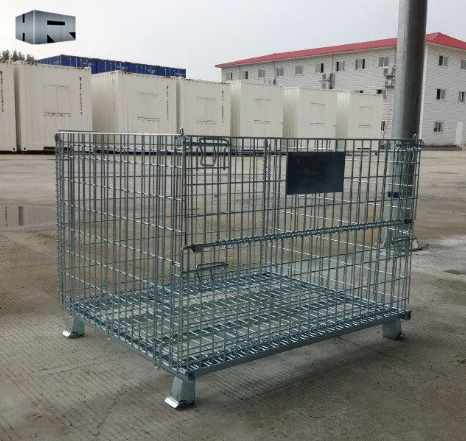
Mesh containers have become a popular choice for storage purposes due to their numerous advantages. Whether it is for industrial warehouses, retail stores, or household organization, mesh containers offer several benefits over traditional solid containers. In this article, we will explore the advantages of using a mesh container in storage.
1. Visibility: One of the main advantages of using a mesh container is the visibility it provides. Unlike solid containers, mesh containers have an open design with small holes or gaps between the wires. This allows for easy visibility and identification of stored items without the need to open or move containers. It saves time and effort, particularly in large storage facilities where finding specific items quickly is crucial.
2. Ventilation: Mesh containers have excellent ventilation properties, which makes them suitable for storing perishable items or items that require good airflow. The mesh design allows air to circulate freely, preventing the accumulation of moisture and the growth of mold and mildew. It is especially beneficial for food storage, as it helps maintain the freshness and quality of the stored products.
3. Durability: Mesh containers are typically made from heavy-duty materials such as steel or wire mesh. This makes them highly durable and capable of withstanding rough handling and various environmental conditions. They are resistant to corrosion, impact, and temperature changes, ensuring that the stored items remain safe and secure. Moreover, the sturdy construction of mesh containers makes them stackable, maximizing storage space while maintaining stability.
4. Safety: Mesh containers offer enhanced safety during storage and transportation. The mesh walls prevent small or loose items from falling out, reducing the risk of accidents and injuries. Additionally, some mesh containers come with locking mechanisms or lids to provide extra security and protect valuable or confidential items. This makes them suitable for industries where safety and security are primary concerns, such as pharmaceuticals, electronics, or automotive manufacturing.
5. Space optimization: Mesh containers are designed to maximize storage space. Their stackable and collapsible features allow for efficient use of vertical space when stacked on top of each other. When not in use, they can be easily folded or collapsed, minimizing the storage area required. This is particularly advantageous for businesses with limited storage space or for individuals looking to organize their homes efficiently.
6. Easy handling and access: Mesh containers are designed for easy handling. They often come with handles, access gates, or wheels for convenient transportation and movement. The open design of mesh containers allows for easy loading and unloading, eliminating the need for repetitive opening and closing. This saves time and effort, increasing productivity in storage and logistics operations.
7. Environmental sustainability: Using mesh containers promotes environmental sustainability. As they are reusable and highly durable, mesh containers reduce the need for single-use packaging materials, such as cardboard boxes or plastic wrapping. By investing in mesh containers, businesses and individuals can contribute to reducing waste production and minimizing their carbon footprint.
8. Versatility: Mesh containers are versatile storage solutions. They can be used in various industries and environments, including warehouses, retail stores, manufacturing facilities, and even personal garages or sheds. Their adaptability lies in their range of sizes, designs, and configurations, allowing users to find the most suitable container for their specific storage needs.
In conclusion, the advantages of using a mesh container in storage are numerous. The visibility, ventilation, durability, safety, space optimization, easy handling, environmental sustainability, and versatility make mesh containers an attractive choice for organizing and storing items. Whether for business or personal use, the benefits of mesh containers enhance efficiency, productivity, and the overall quality of storage operations.




Comentario
(0)